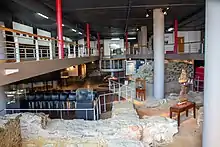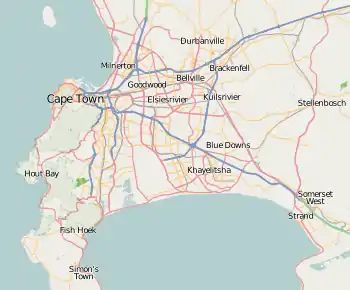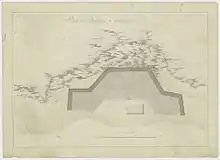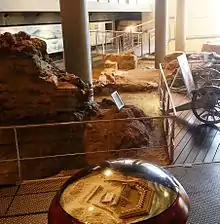Chavonnes Battery
The Chavonnes Battery was a fortification protecting Cape Town, South Africa, built in the early 18th century. It is now a museum and function venue.
| Chavonnes battery | |
|---|---|
 The interior of the museum | |
| Location | Victoria & Alfred Waterfront, Cape Town, South Africa |
| Coordinates | 33°54′26″S 18°25′17″E |
| Built | 1714–1725 |
| Built for | Dutch East India Company |
 Location of Chavonnes battery in Cape Town | |
History

The battery was one of the coastal fortifications of the Cape Peninsula linked to the Castle of Good Hope.[1] It was built in 1714–1725 by the Dutch East India Company,[2] and named after its originator, Maurits Pasques de Chavonnes, who was the governor of the Cape Colony.

The battery was built in a “U” shape with a stone wall built on a rocky outcrop on the Western flank at the waters edge.[3] It had 16 mounted guns with an arc of fire of nearly 180 degrees.[4] The battery also served as a prison and a quarantine and convalescent wing of the old Somerset Hospital.[5][6]
It was used to protect the bay and town until 1861 when construction work started on the Alfred basin and some of the stone and rubble from the site was used to create a breakwater. Further damage occurred when coal bunkers and later a fish factory were built over the site.[7]
Excavation and preservation

In the 1990s, during the development of the Clock Tower Precinct at the Victoria & Alfred Waterfront and the construction of an office building for the BoE Stockbrokers group and Nedbank much of the battery was excavated by archaeologists from the University of Cape Town, and has now been opened as a visitor attraction that includes a museum, hosts contemporary art exhibitions, offers guided tours, venue hire and cannon firing.
The museum includes the excavated walls, well and other components of part of the battery, with displays on cannons and the equipment needed to maintain and fire them and information boards related to the history of Cape Town.[8]
References
- Gabeba, Abrahams (1993). "The Grand Parade, Cape Town: Archaeological Excavations of the seventeenth century Fort de Goede Hoop". Fortifications of the Cape Peninsula. 48: 3. JSTOR 3888871.
- "Chavonnes Battery". V&A Waterfront. Archived from the original on 2 December 2010. Retrieved 18 September 2010.
- "A part of old Cape Town that refused to die". Chavonnes Battery museum. Retrieved 18 September 2010.
- "Chavonnes Battery Museum". Cape Town Travel. Archived from the original on 23 March 2010. Retrieved 18 September 2010.
- "V&A Waterfront, Cape Town". SA Venues. Retrieved 26 September 2010.
- "News". CASEMATE – The FSG News Letter. Fortress Study Group (74). September 2005. Retrieved 18 September 2010.
- Werz, Buno E.J.S. "Strategic environmental assessment (SEA) for the port of Cape Town" (PDF). Ocean Docs. Retrieved 18 September 2010.
- "Museum". Chavonnes Battery museum. Retrieved 18 September 2010.
External links
| Wikimedia Commons has media related to Chavonnes Battery. |